As the war in Eastern Ukraine escalates, the widows of Donetsk are left without money, husbands, or hope.
Olga Fedorovsky is guided towards the open casket by two men dressed in black. They give her water from a green plastic bottle. She drinks, and lets out a muffled scream. In front of her lies the body of the man with whom she spent the last 20 years.
When pro-Russian rebels sieged the administrative buildings here in Donetsk in the spring of 2014, her husband Oleg was one of the locals who joined them. He was in his early 40s and ready to fight against his motherland for an independent Donbas.
Later that year he met Roma Zhulykov and Maksim Khoroschko. The three friends fought together and became close. Today, they are all dead. Khoroschko’s funeral was held yesterday, and tomorrow, Zhulykov will be buried. Left behind are their widows and families, who have to keep living in a place where hope has been lost.
The priest places a loaf of bread on the coffin. With his grizzled, weathered face he is the most terrifying person in the heavily armed funeral procession. “We have different paths in life,” he says, “and some have shorter paths than others. Soldiers go directly to God.”
Olga kisses her husband’s pale face for the last time. He wears a white ribbon on his head, which partly covers the bandages over his left temple. The gravediggers put out their cigarettes before they shut the coffin. Oleg is lowered into the ground.
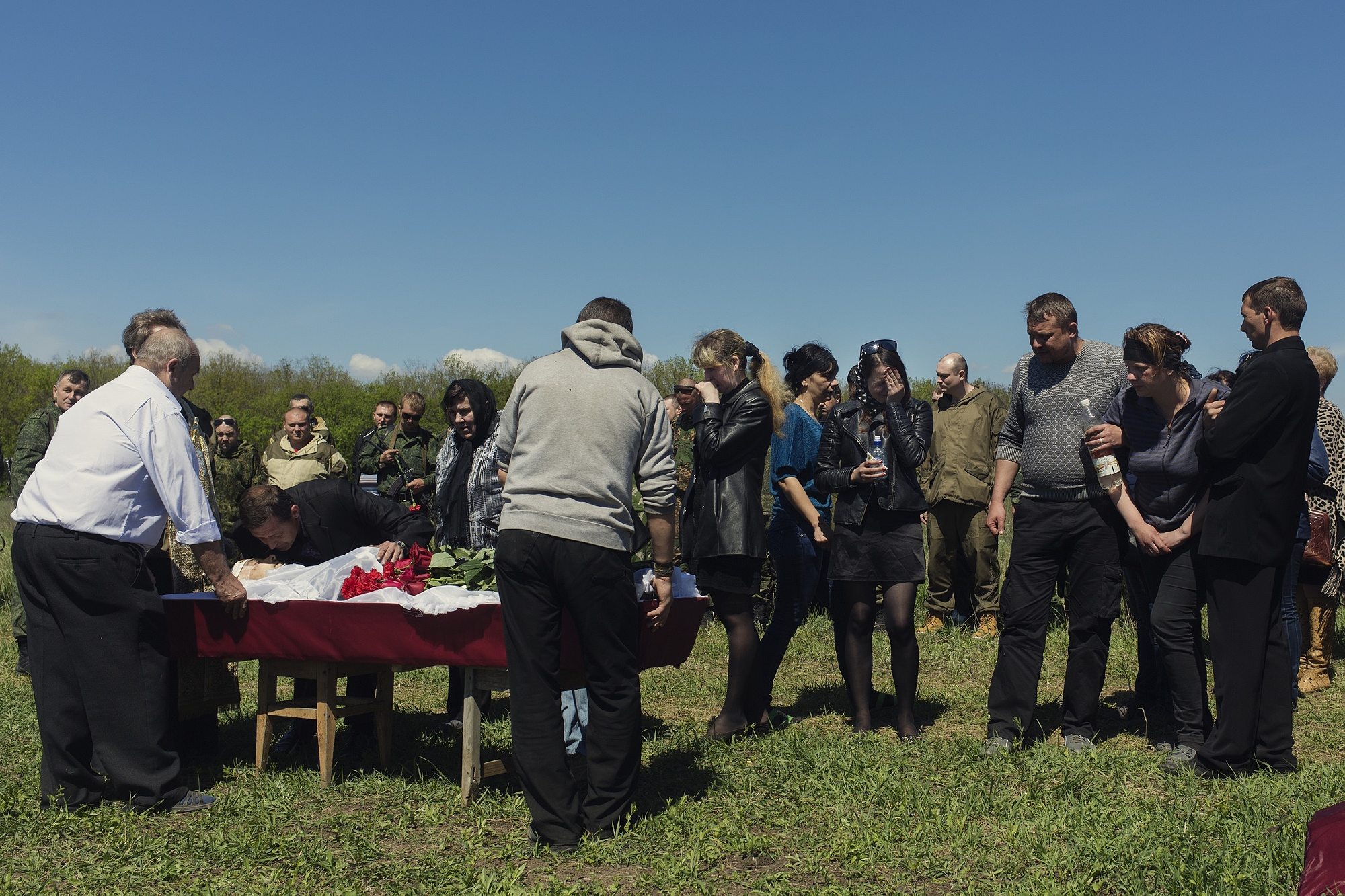
Though the media has turned towards other conflicts, the war in Eastern Ukraine is escalating. The OSCE says that heavy weapons are being brought back to the frontline, and the UN reports schools and hospitals are being used to stock them. The last three months have been the deadliest since August 2015. The official death toll stands at 9,553 people.
At Oleg’s funeral, we meet Ina Layevska. She wears a uniform, and has pitch-black hair. It is her job to deliver the news to the widow when a soldier is killed. “I don’t have time to stop crying over one soldier before we lose the next,” she says. She is simply known as “mom” in the 11th Battalion, a group of 360 men commanded by her husband. She says she takes care of the psychological welfare of the soldiers, keeps up their morale and follows up on their widows.
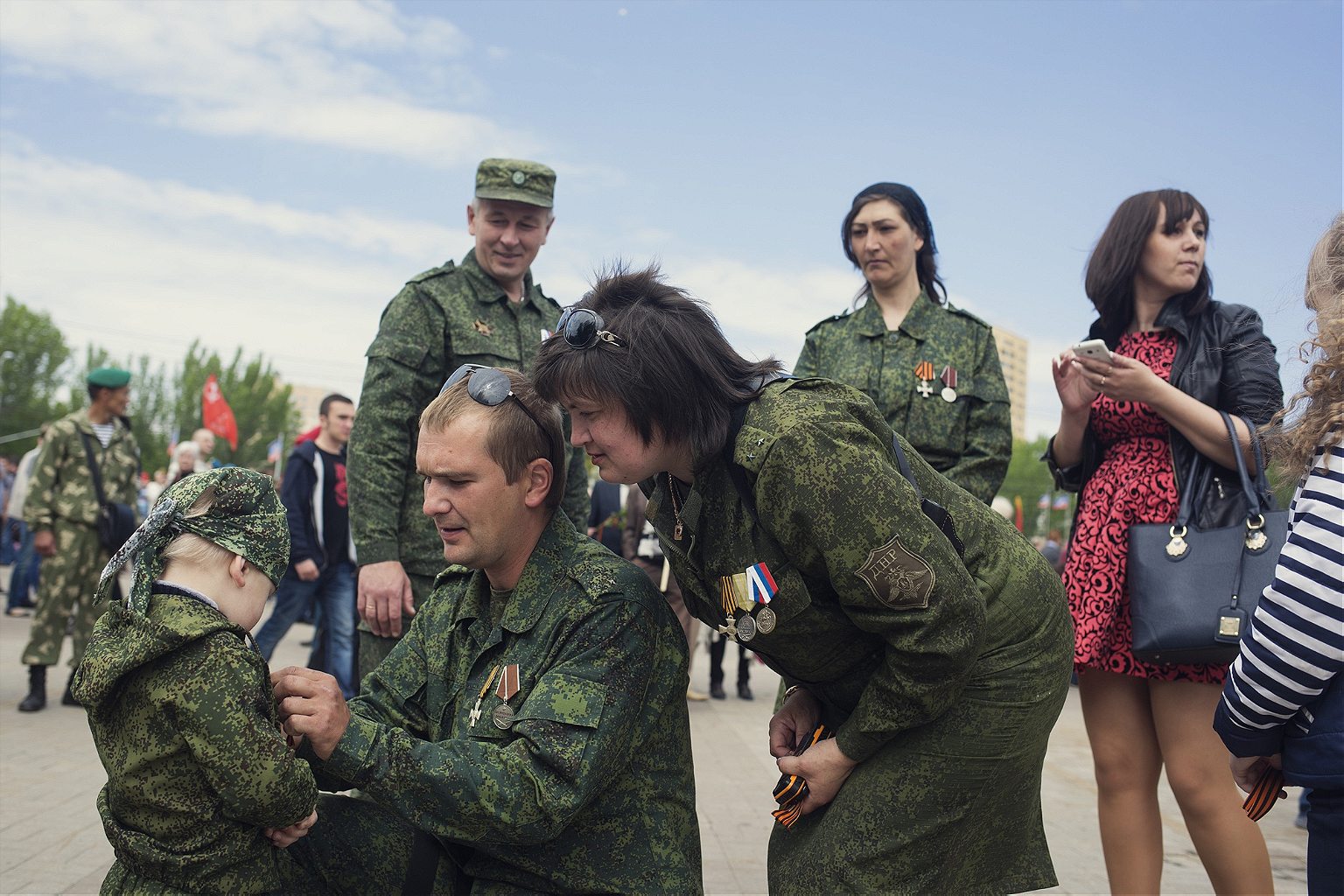
Morale is extremely low on both sides of the frontline. The Ukrainian soldiers we talk to are disappointed with their government, and with the fact that Donetsk seems lost for good. Many think that politicians didn’t act fast enough while there was still time. Now, both the rebels and the Ukrainian forces have to follow the ceasefire they signed in Minsk in February 2015, which prevents them from conducting a new offensive.
Among the rebels, morale is even lower. No advances have been made, and they are tired of the Russian intelligence officers, who according to our sources, take military decisions on behalf of the rebels. The war is leading nowhere.
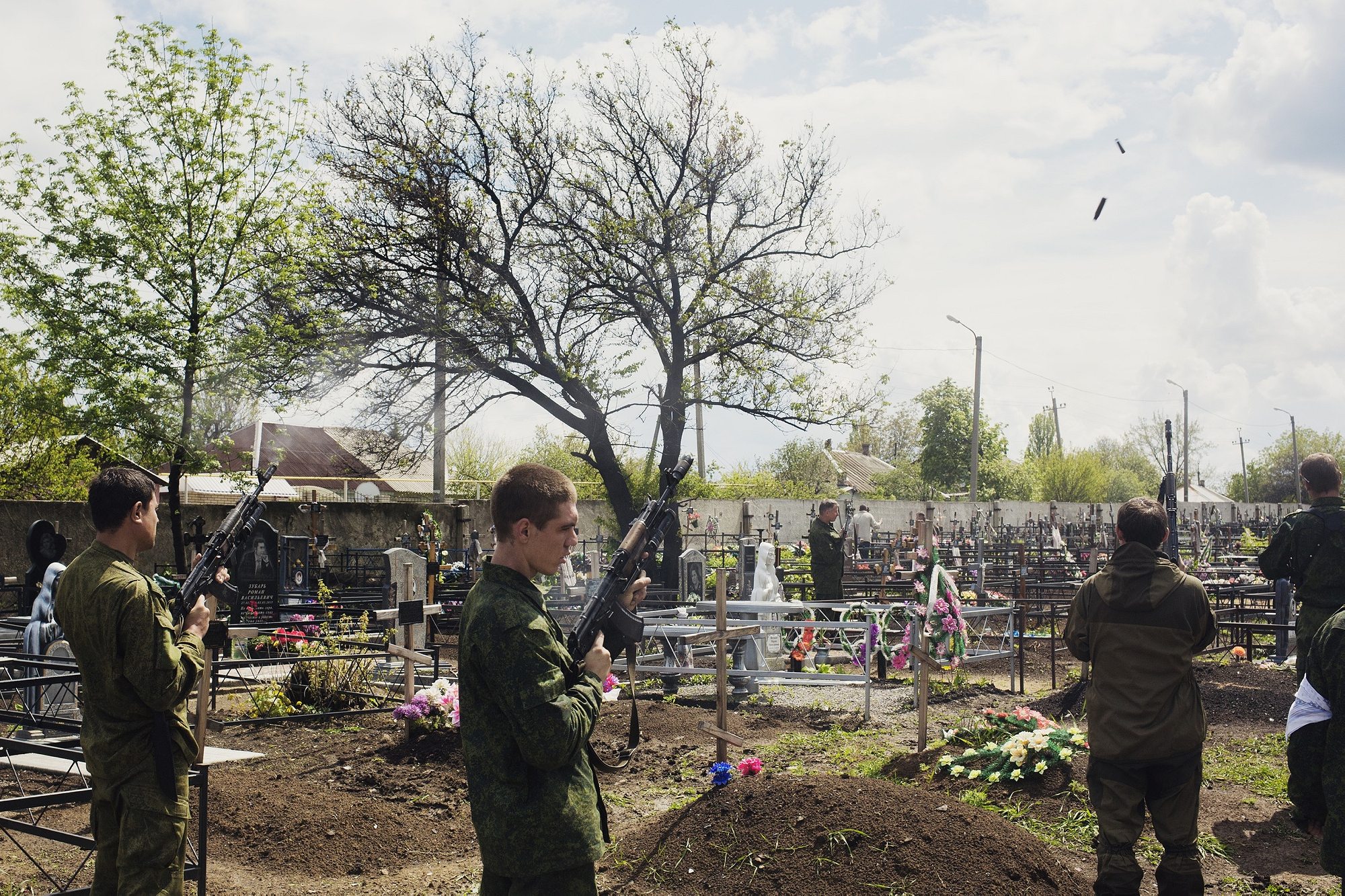
Three days after Oleg Fedorovsky’s funeral, we are at his widow’s house. Olga stands in a dark room with folded arms. Her father sits at the table, smoking. “What is this war good for? What? What?” he sobs. If they are lucky, and bureaucracy is on their side, Olga will get a small, monthly compensation from the rebel government. But this money will not be enough to feed a family.
Layevska, the battalion mother, is also present. She is holding a single rose and stands next a grocery bag of canned food. During each holiday, she tends to the widows. Today, she has 11 roses and the same number of grocery bags in her trunk. Before joining the army, Layevska worked as a teacher for 22 years. She taught literature and Russian to 7-year-olds. After the Maidan Revolution in Kiev, though, she felt a strong need to “protect her country.” She left her children behind and came here to fight.
“In Western Ukraine, they were tearing down Soviet memorials and they started talking about banning Russian. But you can not erase history. It will always be there, for good or bad.” She says she felt her culture was under threat. That’s why she and her husband, a miner, learned how to shoot and decided to take up arms against their country. After a few months on the frontline, her husband was promoted to commander and she became the mom of the battalion. With her, we visit the homes of many of Donetsk’s widows and try to retrace the last days of the three friends: Oleg, Roma and Maksim.
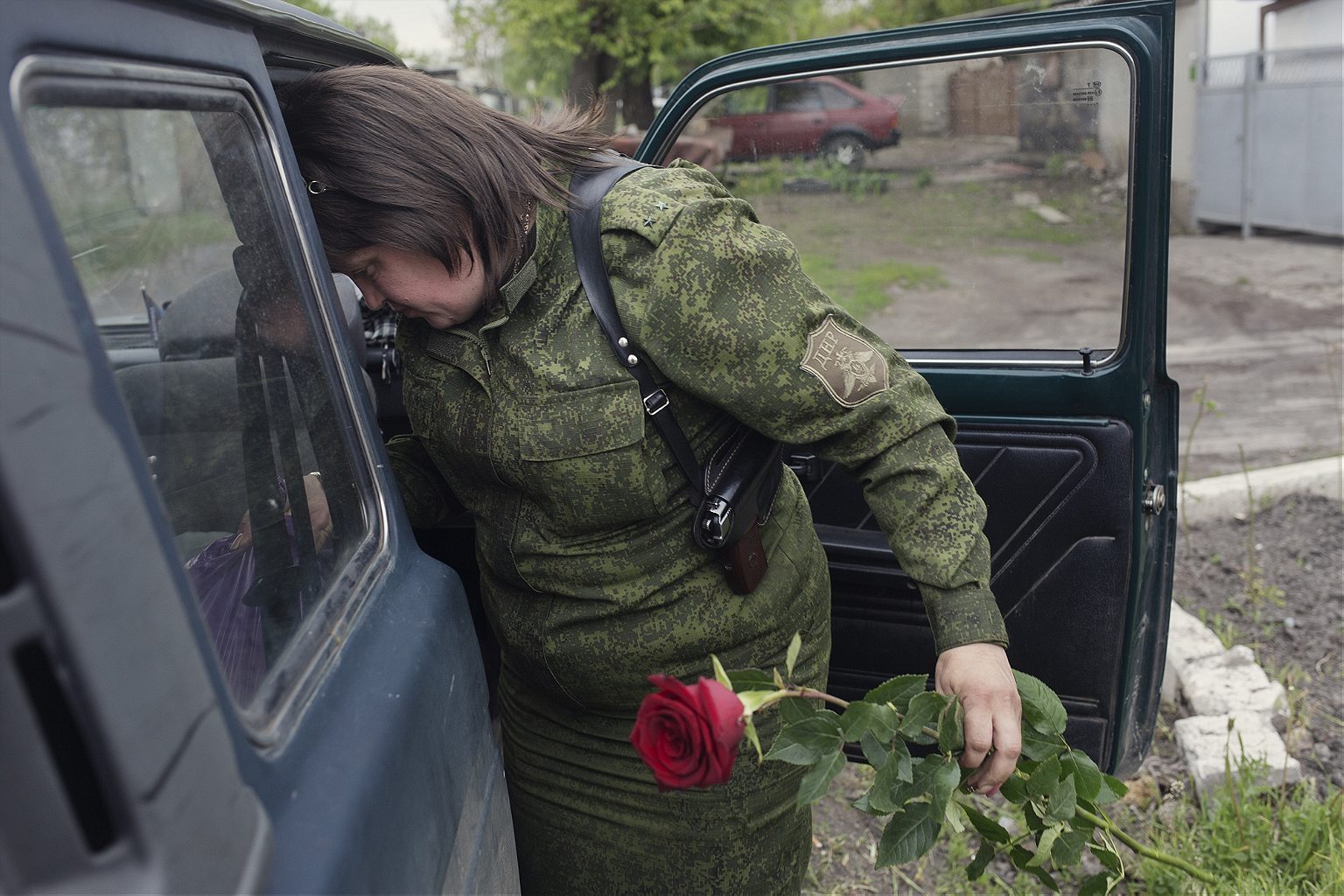
When the war came to Donetsk in the spring of 2014, Roma Zhulykov worked as a construction worker during the day, and guarded the local hospital at night. There, he saw injured civilians being rushed through the gates on a nightly basis. He decided to join the war.
“I tell my sons that he took a bullet for a friend. I don’t want to know anything more about the circumstances,” says his widow, Marina, when we visit with Layevska. Her eldest brings out a tuba. In a few days, he will be playing at the celebrations that follow Victory Day, a commemoration of the Soviet victory over Nazi Germany that has also turned into one for the ongoing war.
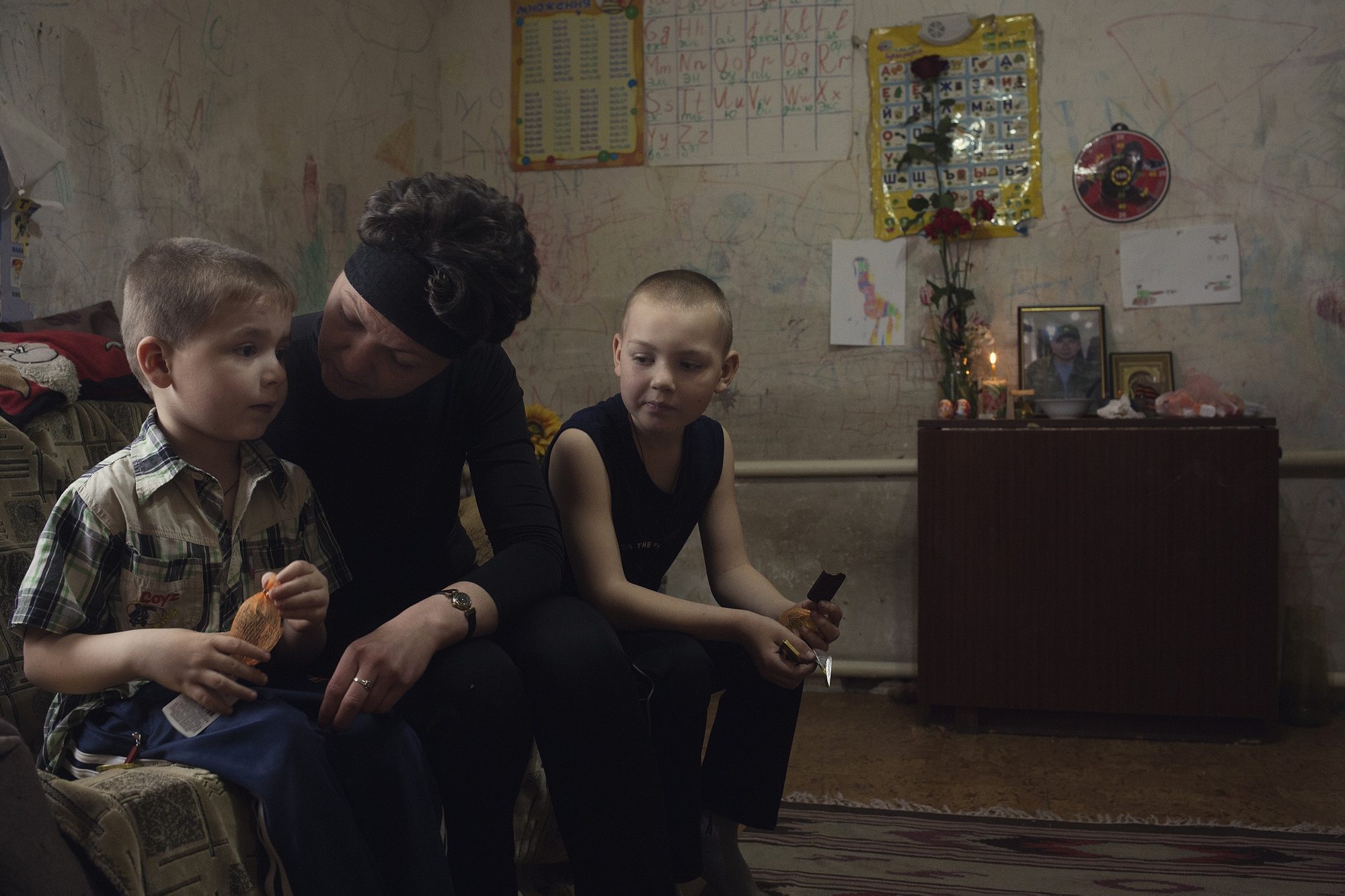
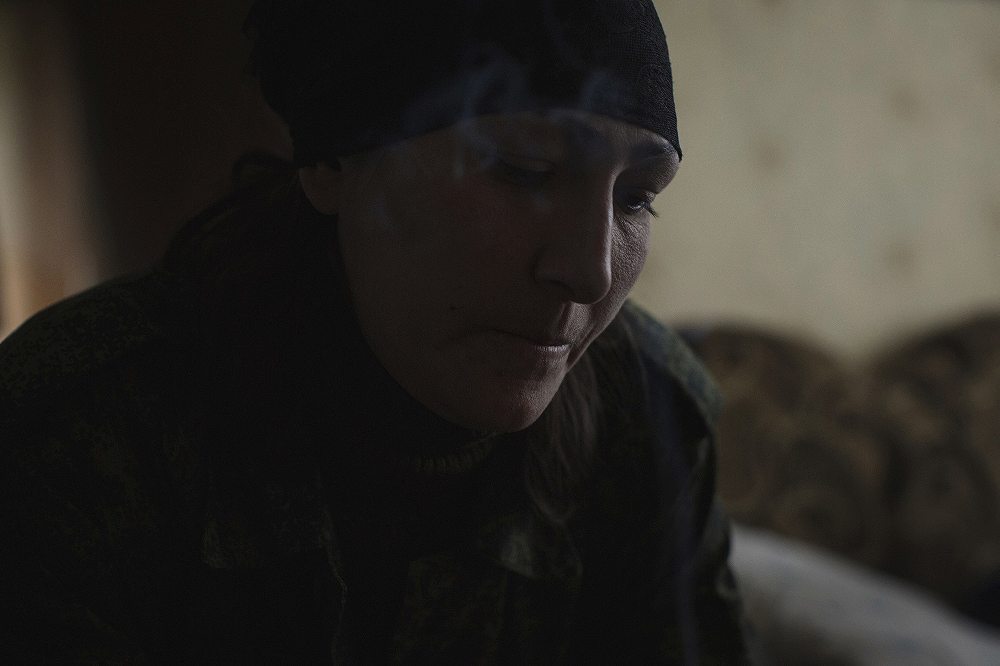
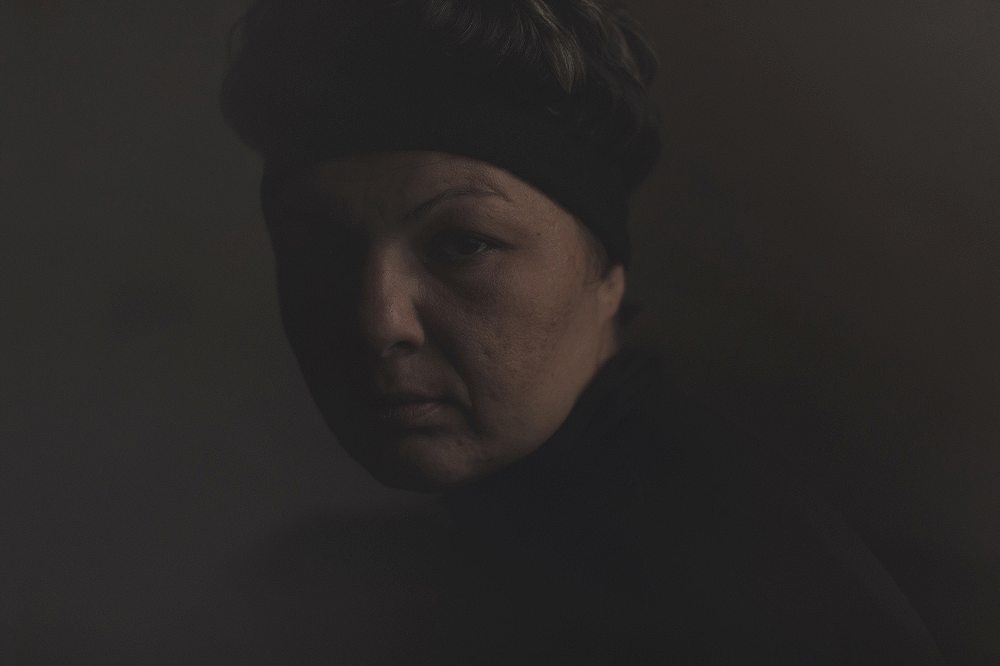
In a small apartment, we meet Ljuba. She asks us not to use her last name because she is still fighting with the rebels. The widows of Donetsk are not all silent victims of the war. Ljuba was in love with Maksim Khoroschko, the third friend of the group. Though he was married, they started dating on the frontline and lived in this apartment in the suburbs of Donetsk on their days off. Ljuba says he called her his “war bride.”
“I haven’t cleaned up since Maksim was alive,” she explains. Empty vodka bottles lie scattered around full ashtrays and empty pillboxes. “We used to lie here in bed and have a party when we had some spare time. Then the front called, and we had to hurry back.”
Ljuba shows us blurry photos taken with her phone. They show a group of soldiers gathered around a table, looking at a map. Two hours after the picture was taken, their commander asked for volunteers to advance through an underground tunnel. Maksim and Roma were selected. Oleg and Ljuba guarded the other end.
“Roma was whistling. I don’t know why, but he was. We called him shastniy, the honest one. He didn’t say much because he was shy, but I knew that he was afraid for his family at home,” Ljuba says.
Ljuba and Oleg heard a loud bang from their position, and immediately rushed to the other side. They found Roma’s body. Maksim lost both his arms in the explosion. “I held him until he died. Then I closed his eyes.”
She wipes a tear away, puts a kettle on, and lights a cigarette. When we ask what happened to Oleg, her face turns: he shot himself during a visit back home. “Now that Oleg is gone, I think many in the battalion are going to quit. They don’t want to go on without him.” But she says that she will.